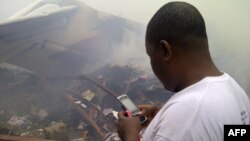ABUJA —
Weeks after the Islamist militant group known as Boko Haram attacked more than 30 cell phone towers, residents of some of the most volatile cities in Nigeria say they feel imprisoned with phones and Internet service barely working.
When reporting from the central city of Abuja, it's hard to get audio from much of the north because the Internet is not nearly strong enough. When we call, a message usually says the phone is off or the networks are busy.
Earlier this month, Boko Haram claimed responsibility for attacking mobile phone towers near several northern cities, saying the phone companies were helping the government spy on them.
A VOA reporter in Maiduguri spoke to residents who say now, with hardly any phone and internet service, their businesses are failing and they feel isolated and scared.
Maiduguri is best known for being the original home of Boko Haram, which has been blamed for more than 600 deaths this year alone. The group has targeted churches, schools, markets, newspaper offices, government officials and security forces.
Kabir Mato, director of the Institute for Anti-Corruption Studies at the University of Abuja, says the insurgency is a result of the huge divide between Nigeria's rich and extreme poor, which is most of the population.
"The leaders live in continuously generated houses. Big buildings with very strong walls under air conditioners. And the rest are there 24 hours without electricity," said Mato. "There's no piped in water. It's so difficult to eat. I'm of the view that the social crisis in this country is greatly responsible for the insurrections we are having."
Mato says extra-judicial killings are also responsible for the rise of Boko Haram.
The group says it wants to impose Islamic law and free imprisoned members.
In Maiduguri, the VOA reporter says the phone companies are publically promising to restore service and asking for patience while they work. But an employee, who asked not to be named, said the workers aren't fixing the equipment because they are afraid they will be attacked. Many of those workers, he added, have fled the region.
Security forces have promised to increase police presence to protect the telecom equipment. But in Nigeria, police and soldiers, like everyone else, rely on their cell phones to communicate.
When reporting from the central city of Abuja, it's hard to get audio from much of the north because the Internet is not nearly strong enough. When we call, a message usually says the phone is off or the networks are busy.
Earlier this month, Boko Haram claimed responsibility for attacking mobile phone towers near several northern cities, saying the phone companies were helping the government spy on them.
A VOA reporter in Maiduguri spoke to residents who say now, with hardly any phone and internet service, their businesses are failing and they feel isolated and scared.
Maiduguri is best known for being the original home of Boko Haram, which has been blamed for more than 600 deaths this year alone. The group has targeted churches, schools, markets, newspaper offices, government officials and security forces.
Kabir Mato, director of the Institute for Anti-Corruption Studies at the University of Abuja, says the insurgency is a result of the huge divide between Nigeria's rich and extreme poor, which is most of the population.
"The leaders live in continuously generated houses. Big buildings with very strong walls under air conditioners. And the rest are there 24 hours without electricity," said Mato. "There's no piped in water. It's so difficult to eat. I'm of the view that the social crisis in this country is greatly responsible for the insurrections we are having."
Mato says extra-judicial killings are also responsible for the rise of Boko Haram.
The group says it wants to impose Islamic law and free imprisoned members.
In Maiduguri, the VOA reporter says the phone companies are publically promising to restore service and asking for patience while they work. But an employee, who asked not to be named, said the workers aren't fixing the equipment because they are afraid they will be attacked. Many of those workers, he added, have fled the region.
Security forces have promised to increase police presence to protect the telecom equipment. But in Nigeria, police and soldiers, like everyone else, rely on their cell phones to communicate.





